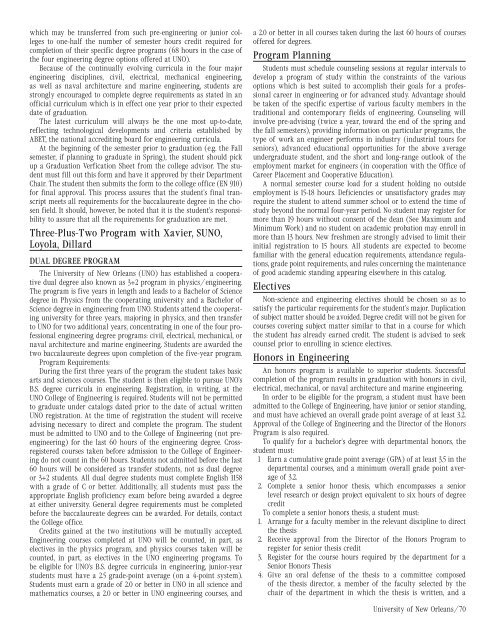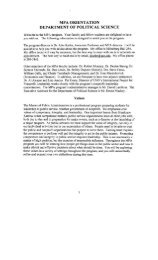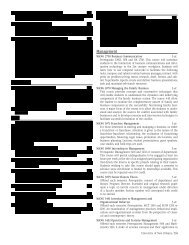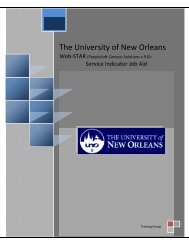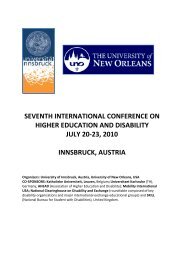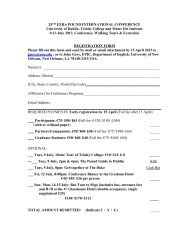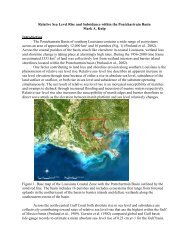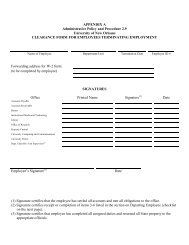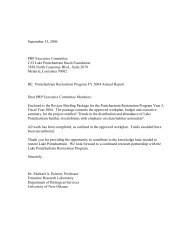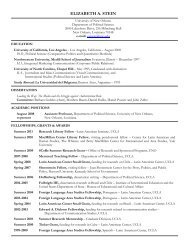Untitled - University of New Orleans
Untitled - University of New Orleans
Untitled - University of New Orleans
You also want an ePaper? Increase the reach of your titles
YUMPU automatically turns print PDFs into web optimized ePapers that Google loves.
which may be transferred from such pre-engineering or junior colleges<br />
to one-half the number <strong>of</strong> semester hours credit required for<br />
completion <strong>of</strong> their specific degree programs (68 hours in the case <strong>of</strong><br />
the four engineering degree options <strong>of</strong>fered at UNO).<br />
Because <strong>of</strong> the continually evolving curricula in the four major<br />
engineering disciplines, civil, electrical, mechanical engineering,<br />
as well as naval architecture and marine engineering, students are<br />
strongly encouraged to complete degree requirements as stated in an<br />
<strong>of</strong>ficial curriculum which is in effect one year prior to their expected<br />
date <strong>of</strong> graduation.<br />
The latest curriculum will always be the one most up-to-date,<br />
reflecting technological developments and criteria established by<br />
ABET, the national accrediting board for engineering curricula.<br />
At the beginning <strong>of</strong> the semester prior to graduation (e.g. the Fall<br />
semester, if planning to graduate in Spring), the student should pick<br />
up a Graduation Verfication Sheet from the college advisor. The student<br />
must fill out this form and have it approved by their Department<br />
Chair. The student then submits the form to the college <strong>of</strong>fice (EN 910)<br />
for final approval. This process assures that the student’s final transcript<br />
meets all requirements for the baccalaureate degree in the chosen<br />
field. It should, however, be noted that it is the student’s responsibility<br />
to assure that all the requirements for graduation are met.<br />
Three-Plus-Two Program with Xavier, SUNO,<br />
Loyola, Dillard<br />
DUAL DEGREE PROGRAM<br />
The <strong>University</strong> <strong>of</strong> <strong>New</strong> <strong>Orleans</strong> (UNO) has established a cooperative<br />
dual degree also known as 3+2 program in physics/engineering.<br />
The program is five years in length and leads to a Bachelor <strong>of</strong> Science<br />
degree in Physics from the cooperating university and a Bachelor <strong>of</strong><br />
Science degree in engineering from UNO. Students attend the cooperating<br />
university for three years, majoring in physics, and then transfer<br />
to UNO for two additional years, concentrating in one <strong>of</strong> the four pr<strong>of</strong>essional<br />
engineering degree programs: civil, electrical, mechanical, or<br />
naval architecture and marine engineering. Students are awarded the<br />
two baccalaureate degrees upon completion <strong>of</strong> the five-year program.<br />
Program Requirements:<br />
During the first three years <strong>of</strong> the program the student takes basic<br />
arts and sciences courses. The student is then eligible to pursue UNO’s<br />
B.S. degree curricula in engineering. Registration, in writing, at the<br />
UNO College <strong>of</strong> Engineering is required. Students will not be permitted<br />
to graduate under catalogs dated prior to the date <strong>of</strong> actual written<br />
UNO registration. At the time <strong>of</strong> registration the student will receive<br />
advising necessary to direct and complete the program. The student<br />
must be admitted to UNO and to the College <strong>of</strong> Engineering (not preengineering)<br />
for the last 60 hours <strong>of</strong> the engineering degree. Crossregistered<br />
courses taken before admission to the College <strong>of</strong> Engineering<br />
do not count in the 60 hours. Students not admitted before the last<br />
60 hours will be considered as transfer students, not as dual degree<br />
or 3+2 students. All dual degree students must complete English 1158<br />
with a grade <strong>of</strong> C or better. Additionally, all students must pass the<br />
appropriate English pr<strong>of</strong>iciency exam before being awarded a degree<br />
at either university. General degree requirements must be completed<br />
before the baccalaureate degrees can be awarded. For details, contact<br />
the College <strong>of</strong>fice.<br />
Credits gained at the two institutions will be mutually accepted.<br />
Engineering courses completed at UNO will be counted, in part, as<br />
electives in the physics program, and physics courses taken will be<br />
counted, in part, as electives in the UNO engineering programs. To<br />
be eligible for UNO’s B.S. degree curricula in engineering, junior-year<br />
students must have a 2.5 grade-point average (on a 4-point system).<br />
Students must earn a grade <strong>of</strong> 2.0 or better in UNO in all science and<br />
mathematics courses, a 2.0 or better in UNO engineering courses, and<br />
a 2.0 or better in all courses taken during the last 60 hours <strong>of</strong> courses<br />
<strong>of</strong>fered for degrees.<br />
Program Planning<br />
Students must schedule counseling sessions at regular intervals to<br />
develop a program <strong>of</strong> study within the constraints <strong>of</strong> the various<br />
options which is best suited to accomplish their goals for a pr<strong>of</strong>essional<br />
career in engineering or for advanced study. Advantage should<br />
be taken <strong>of</strong> the specific expertise <strong>of</strong> various faculty members in the<br />
traditional and contemporary fields <strong>of</strong> engineering. Counseling will<br />
involve pre-advising (twice a year, toward the end <strong>of</strong> the spring and<br />
the fall semesters), providing information on particular programs, the<br />
type <strong>of</strong> work an engineer performs in industry (industrial tours for<br />
seniors), advanced educational opportunities for the above average<br />
undergraduate student, and the short and long-range outlook <strong>of</strong> the<br />
employment market for engineers (in cooperation with the Office <strong>of</strong><br />
Career Placement and Cooperative Education).<br />
A normal semester course load for a student holding no outside<br />
employment is 15-18 hours. Deficiencies or unsatisfactory grades may<br />
require the student to attend summer school or to extend the time <strong>of</strong><br />
study beyond the normal four-year period. No student may register for<br />
more than 19 hours without consent <strong>of</strong> the dean (See Maximum and<br />
Minimum Work) and no student on academic probation may enroll in<br />
more than 13 hours. <strong>New</strong> freshmen are strongly advised to limit their<br />
initial registration to 15 hours. All students are expected to become<br />
familiar with the general education requirements, attendance regulations,<br />
grade point requirements, and rules concerning the maintenance<br />
<strong>of</strong> good academic standing appearing elsewhere in this catalog.<br />
Electives<br />
Non-science and engineering electives should be chosen so as to<br />
satisfy the particular requirements for the student’s major. Duplication<br />
<strong>of</strong> subject matter should be avoided. Degree credit will not be given for<br />
courses covering subject matter similar to that in a course for which<br />
the student has already earned credit. The student is advised to seek<br />
counsel prior to enrolling in science electives.<br />
Honors in Engineering<br />
An honors program is available to superior students. Successful<br />
completion <strong>of</strong> the program results in graduation with honors in civil,<br />
electrical, mechanical, or naval architecture and marine engineering.<br />
In order to be eligible for the program, a student must have been<br />
admitted to the College <strong>of</strong> Engineering, have junior or senior standing,<br />
and must have achieved an overall grade point average <strong>of</strong> at least 3.2.<br />
Approval <strong>of</strong> the College <strong>of</strong> Engineering and the Director <strong>of</strong> the Honors<br />
Program is also required.<br />
To qualify for a bachelor’s degree with departmental honors, the<br />
student must:<br />
1 Earn a cumulative grade point average (GPA) <strong>of</strong> at least 3.5 in the<br />
departmental courses, and a minimum overall grade point average<br />
<strong>of</strong> 3.2.<br />
2. Complete a senior honor thesis, which encompasses a senior<br />
level research or design project equivalent to six hours <strong>of</strong> degree<br />
credit<br />
To complete a senior honors thesis, a student must:<br />
1. Arrange for a faculty member in the relevant discipline to direct<br />
the thesis<br />
2. Receive approval from the Director <strong>of</strong> the Honors Program to<br />
register for senior thesis credit<br />
3. Register for the course hours required by the department for a<br />
Senior Honors Thesis<br />
4. Give an oral defense <strong>of</strong> the thesis to a committee composed<br />
<strong>of</strong> the thesis director, a member <strong>of</strong> the faculty selected by the<br />
chair <strong>of</strong> the department in which the thesis is written, and a<br />
<strong>University</strong> <strong>of</strong> <strong>New</strong> <strong>Orleans</strong>/70


